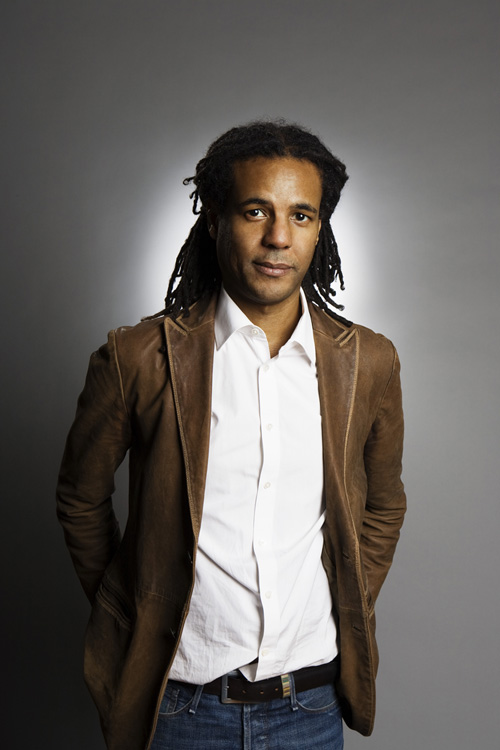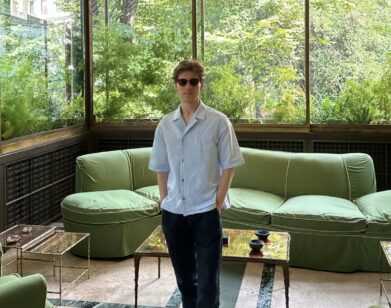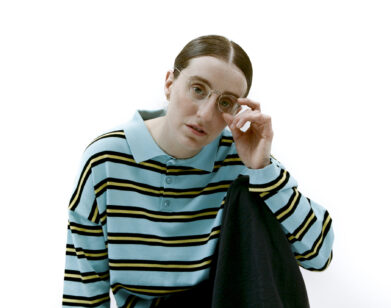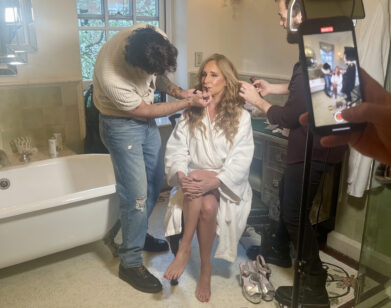Colson Whitehead’s Brains

COLSON WHITEHEAD
We can’t seem to outrun them. We have zombies on our big screens, our small screens, our streaming devices and cable. We have international and homegrown zombies. Zombie masks, goopy zombie make-up, and zombie leggings, apparently, are all the rage this spooky season. And now, thanks to the wry imagination of MacArthur Fellowship recipient Colson Whitehead, we have the thinking person’s zombie book: Zone One, which hit the New York Times bestseller list this week. Finally: zombie literature for those of us who still have full brain capacity. We sat down with Mr. Whitehead, whose own full-bodied brain has previously brought us such other literary creations as The Intuitionist, John Henry Days, The Colossus of New York, Apex Hides the Hurt, and Sag Harbor, all of which went on to be nominated for and/or win notable literary book awards. With his newest, Zone One, Whitehead stretches his bones with his own take on the post-apocalyptic zombie novel. Manhattan is a wasteland littered with the undead; Mark Spitz and his clean-up crew are charged with rounding up and disposing of the protein-hungry stragglers left in the only safe zone on the island. A single wall of concrete barriers, put up along Canal Street, creates Zone One.
JENNIFER SKY: Is the apocalypse coming?
COLSON WHITEHEAD: [laughs] Um, is the apocalypse coming? I hope not. There are some places around the world I haven’t seen yet. I’ve never been to the Galapagos Islands, I’ve only been to Vancouver once, so hopefully I’ll have time to get some travel in before it comes.
SKY: Once upon a time, you won the MacArthur Genius Award. Zombies are characteristically unliterary. What caused you to focus your talents on the flesh-eating undead?
WHITEHEAD: Other people have hang-ups about what’s literary, or genre, or whatever, and that’s sort of not my problem. You’re supposed to write what you have to write, and you’re supposed to keep moving. So my last book was kind of an anti-coming-of-age novel. This one’s a horror novel. I have no idea what the next one will be, but I assume it will be different. I just try to keep things interesting for me and for people who follow me.
SKY: Okay, so Zone One is your take on the post-apocalyptic zombie novel. What was your impetus for destroying the world?
WHITEHEAD: My impetus?
SKY: Was there one?
WHITEHEAD: Exactly. Why I wrote this book as opposed to another book at this point, I grew up watching B-movies, horror movies, science fiction movies, reading a lot of horror comics, Stephen King, H.P. Lovecraft, and it was those different influences that made me want to write in the first place. You know, if you’re a writer, you can stay at home and think up weird crap, so it seemed like a good job when I was a kid. I always knew I would eventually write something in the horror or science-fiction vein, and it just seemed time.
SKY: How far in the future do you see the novel happening? It’s set in the future, but an unspecified one.
WHITEHEAD: In my mind it’s 2018, but that’s sort of a random number.
SKY: Okay, so 2018. Do you feel like this could be our future? Our present future, as our current society is, or is this some alt-society that you created?
WHITEHEAD: I think it’s pretty close to how we are now. It’s not a radically reimagined future. I think our tablets and social media’s progressed a little bit. My take on the ruined world that the survivors find themselves in is not too far from what they experienced before. So now that the apocalypse is in abeyance and they’re trying to rebuild things, all the people that they used to be, everything that they used to want, all the bad things they used to do are just waiting to be recalled back into existence and play. So even though 98% of the population is dead, and these people have been through incredible trauma, all the sort of terrible stuff of the pre-apocalypse world is just waiting to come back.
SKY: Right. You started with a new point of origin and had to invent your new world lexicon. I’m wondering how you got your ideas for these new terms, like “skels,” and “stragglers,” and “PASD.”
WHITEHEAD: When you write fiction, you have to start making some stuff up; when I approached this post-apocalyptic form, I had to think of what I wanted to keep, what I wanted to throw out, what conventions did I want to respect, and which ones did I want to ignore. So you know, for me, zombies are slow, they’re [George A.] Romero zombies, they’re the kind of lumbering kind, they’re not fast like all the kids like today. I wanted to create a language for the survivors, so “straggler,” the kind of human statue zombie that’s stuck in the past, is something I added: basically ghosts, the residue of a personality haunting what they used to be. I think it’s your job, when you approach a genre you haven’t dealt with before, to figure out what you want to keep and where there’s room for re-invigoration, or enlarging our idea of what the genre is.
SKY: Define PASD?
WHITEHEAD: Post Apocalyptic Stress Disorder. It seemed that if the world ends and everyone you know is mostly dead, you’d probably be a little bit bummed out… so the remaining psychiatrists have come up with the diagnosis of Post Apocalyptic Stress Disorder, the symptoms of which are insomnia, sleeplessness, eating a lot, eating too little, irritability. Basically, it’s like a case of the Mondays. The things that were making you stressed out before the apocalypse are pretty much the same after the apocalypse.
SKY: Did you study traditional PTSD at all and kind of tweak it for your own use?
WHITEHEAD: No, but it’s a pun. You say PASD fast and it sounds like the past, and of course everyone in the book is obsessed with who they were and what they used to do, so it seemed a handy acronym.
SKY: How have the zombies of yesteryear, like in Michael Jackson’s Thriller, created an impact on you when you were growing up? What sci-fi things or “dead things” in our culture have stuck with you?
WHITEHEAD: Well, there’s a full-grown zombie culture now for the kids. They go on zombie walks, they play Resident Evil, they love Zombieland and 28 Days Later. The antecedents for the zombies in the book, in my book, are the first Romero trilogy, a movie like Return of the Living Dead, and also various post-apocalyptic films I soaked up as a little person. The Omega Man, Escape From New York. So that’s where I’m coming from. You know, I’m a bit older than these youngsters who are putting on zombie makeup and walking around, and they have a different generational accommodation, idea of what the zombie is, and I can’t really speak to the larger trend. My idea of a zombie is located in a paranoid, misanthropic, orientation to the world, so I see the zombie as your family, your spouse, your mom, your brother, your neighbors down the street, the bus driver, being transformed into the monsters you always suspected they were. So if you have various psychological problems, as I do, the zombie nightmare speaks to them.
SKY: I was recently watching an episode of The Walking Dead and was shocked by the amount of gratuitous violence—and yet, it’s a no-no to show sex.
WHITEHEAD: You know, I haven’t thought about it, but there definitely is a double standard when it comes to what we can show on TV. Yes, it’s okay to decapitate somebody, but not show a nipple. That is, you know, [laughs] a quirk in our idea of what’s appropriate for television and what should be in public. But it’s out of my hands, that whole problem.
SKY: [laughs] It’s out of your hands. That’s true. What future do you see for your daughter?
WHITEHEAD: I haven’t taken her out to the desert for gun training or survival, or martial arts, so I think the world will continue to spin. It will be a little warmer because of what we’ve done to the environment, there will be more distractions, but pretty much the same, just a little bit crappier, and I hope that she will thrive.
ZONE ONE IS OUT NOW.






